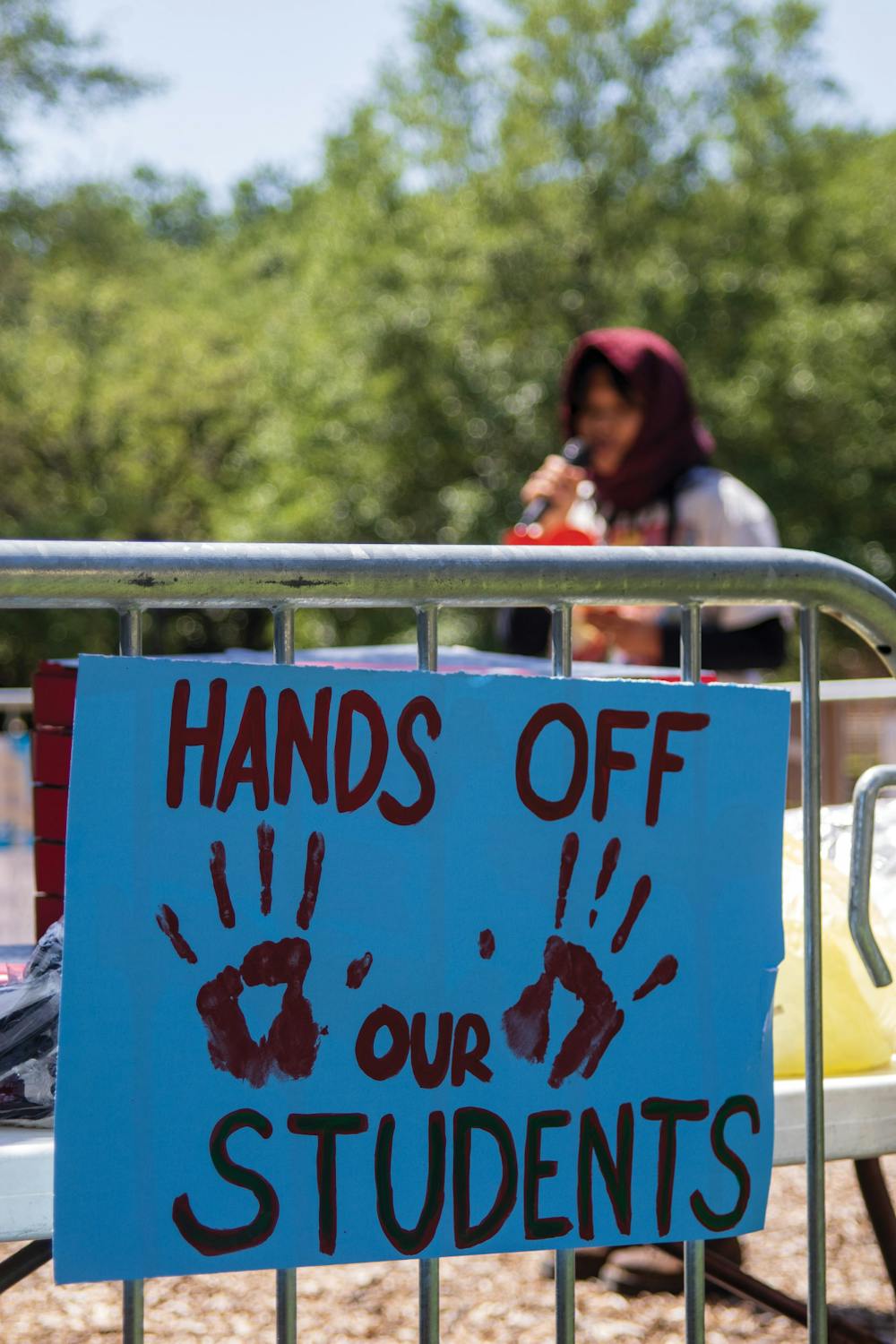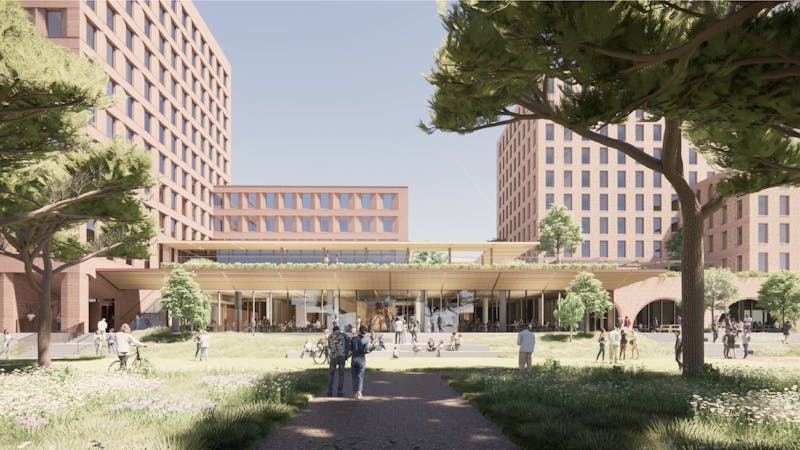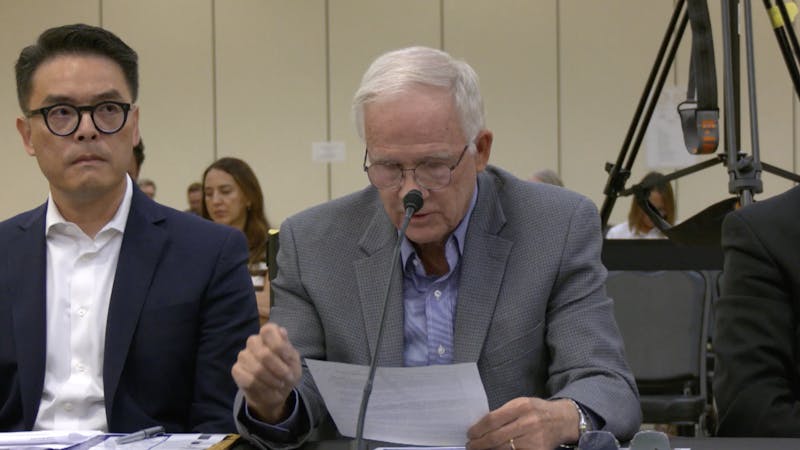‘Will we survive? Will the movement survive?’

A protester gives a speech during the Students for Justice in Palestine demonstration. The protest drew around 75 people who spoke out against President Donald Trump, among other things. Konstantin Savvon / Thresher
Rice Students for Justice in Palestine staged a demonstration April 8. Students walked out in protest of various issues including the detainment of international students; diversity, equity and inclusion rollbacks; ongoing “U.S.-backed genocide” in Palestine; transgender rights and federal funding cuts at the Central Quad from 11 a.m. - 2 p.m.
Matti Haacke, an SJP organizer, said that the organization collaborated with 17 other student groups and five community organizations. Around 75 students attended, according to the Rice University Police Department.
Attendees protested the detaining of Columbia University activist Mahmoud Khalil and Tufts University graduate student Rumeysa Ozturk, chanting, “No borders, no nations, stop the deportations,” and listening to speeches.
Melissa Marschall, professor of political science, made a speech encouraging students to stand up against issues of human rights and protecting their institutions.
“I’m here to speak out about the threats that we’ve been feeling against our freedoms of expression and our freedoms to assemble,” said Marschall, Sid Richardson College magister, in an interview with the Thresher. “We’re seeing the erosion of our democratic institutions by unnecessary acts to take power in the presidency.”
The protest aimed to protect students in light of recent detainments, according to Erica Augenstein, a Rice SJP organizer and Rice Grad Campaign representative.
“Our experience as activists has shown us that the university administrators will always fold because they can survive the next few years,” said Augenstein, a graduate student of history. “Will we survive? Will the movement survive? Probably not, if we don’t fight back.”
Jorge Zazueta, another Rice SJP organizer and Rice Grad Campaign representative, said they hope Rice will commit to protecting students from ICE.
“One of the stances [Rice] can take is declaring this a sanctuary campus and identifying specific spaces as private spaces on campus, which is a legally protected space where ICE cannot …abduct students,” said Zazueta, a graduate student of economics.
Various student organizations mobilized across multiple other issues including transgender rights and DEI rollbacks, Zazueta said.
Haacke said that the protest was launched as a coalition effort as a result of the many issues.
“We’re seeing basic freedoms being attacked,” said Haacke, a Sid Richardson College senior. “We’re seeing fascism in this country take root, we’re seeing activists being kidnapped across the country, we’re seeing attacks on every level of minority population around the country being systematically pushed by this administration.”
Brenda Tan, a graduate student of English attending the protest, said global and local struggles are connected, and she hopes the protest can serve to create solidarity.
“What this protest can successfully do is … to show the campus administration that we’re not happy that campuses nationwide are capitulating to the administration’s undemocratic demands,” Tan said.
“The best we can do, if not change people’s minds, is to show them that we’re not going to back down. People aren’t just going to lie down and take it.”
Marschall said that she hopes the protest will support both students feeling threatened and those taking action to speak out.
“I think every campus needs to stand up,” Marschall said. “It feels impossible to imagine, but this is how authoritarian systems start, gradually, and at some point it’s too late and that’s what I’m worried about.”
Haacke said that he hopes the protest puts pressure on the Rice administration to divulge its investments, which students voted on in a referendum last year, in addition to calling for divestment from pro-Israeli companies.
Augenstein said that the protest drew attention to what she called escalating “U.S. imperial ideology and domination” and “colonial thinking” at Rice, citing the Gibborim Scholarship and protest policy changes.
“There’s less energy for protest than since the genocide began, and the repression against the people that are left in the movement has escalated to degrees we haven’t seen before,” Augenstein said. “You’re seeing a level of the direct abduction of political activists.
“It’s taken a very dark turn,” Augenstein continued. “That fear has reverberated across campuses … people are very very afraid in our circles and even outside of our circles about political speech even if they have any connection to non-citizens, and if they are non-citizens themselves of course.”
Marschall said that she hopes Rice will keep supporting students and faculty.
More from The Rice Thresher

Rice announces Chao College as 12th residential college
Rice announced that the 12th residential college will be named Ting Tsung and Wei Fong Chao College Aug. 19. The college, set to open in fall 2026, will contain nearly 300 on-campus beds.
Dining access fund announced following on-campus unlimited meal swipes
Rice announced new food assistance programs on Tuesday to account for the controversial change in the on-campus meal swipe plan.

Rice disaster prediction model discussed at hearing on deadly Central Texas floods
The House and Senate Select Committees on Disaster Preparedness and Flooding held a hearing on July 31 in Kerrville to address the deadly July 4 flooding in Central Texas. The flooding along the banks of the Guadalupe River killed 108 people, including 37 children. In the charged hearing, Texas lawmakers and flood survivors criticized the local response to the disaster.


Please note All comments are eligible for publication by The Rice Thresher.